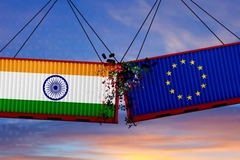Lush discusses fair trade cocoa partnership for peace in conflict areas
Key takeaways
- In the last year, Lush has faced quality and availability challenges with the Colombian Peace Community cocoa beans.
- The Peace Community produces cocoa, giving Lush full traceability on one of its key materials.
- The partnership aims to support the community’s well-being and respects their realities, rather than being driven by external, egocentric priorities.

Lush Cosmetics has been sourcing fair trade cocoa beans through an ongoing strategic partnership with The Peace Community of San José de Apartadó, Colombia, for 15 years.
Personal Care Insights sits down with Lush UK representatives Romain Bernard, raw materials buyer, and Gabbi Loedolff, director of buying, to discuss challenges in sourcing fair trade ingredients from a tumultuous region. They also tell us about how, in the past year, Lush has faced quality and availability challenges with the Colombian Peace Community cocoa beans.
“Sourcing from conflicted areas is tough as it can be complicated to conduct visits to producers, and moving goods out can be slow and complicated. Supporting producers beyond simple purchasing also leads to extra challenges. This is why a true partnership matters,” says Bernard.

“Working with the Peace Community isn’t like dealing with a regular supplier. Here, every commercial conversation needs to recognize that the community faces violence around and toward them, and their reality is shaped by instability and threats. Their life isn’t centered on trade but surviving in their unique, sometimes precarious environment.”
Lush’s partnership with the Peace Community began at the end of 2010, during a time of heightened conflict and violence between guerrilla groups such as FARC (Revolutionary Armed Forces of Colombia) and paramilitary forces, before the 2016 peace agreement.
Bernard says that the Peace Community had declared neutrality and resisted cooperation with armed groups, which exposed them to severe risks, including displacement and massacres.
“We at Lush learned of the community, and were keen to find a way to support their important message of peace. The community grew cocoa, which they often struggled to sell on the local or international market.”
“Cocoa is one of our biggest raw materials, though we had never sourced beans directly from producers before. It felt like an opportunity to create a strong partnership based on trade and solidarity.”
Protection against violence
The Peace Community started in 1997 following Colombia’s armed conflict between FARC guerrillas and right-wing paramilitaries.
 The Peace Community started in 1997 following Colombia’s armed conflict between FARC guerrillas and right-wing paramilitaries.“Partnerships like this protect against violence in several key ways. First, Lush raises awareness and advocates for the Peace Community through our shops, staff, and the wider influence as a UK company operating internationally. This public visibility and solidarity help bring attention and pressure for their protection,” says Bernard.
The Peace Community started in 1997 following Colombia’s armed conflict between FARC guerrillas and right-wing paramilitaries.“Partnerships like this protect against violence in several key ways. First, Lush raises awareness and advocates for the Peace Community through our shops, staff, and the wider influence as a UK company operating internationally. This public visibility and solidarity help bring attention and pressure for their protection,” says Bernard.
“Second, economic support through purchasing cocoa beans provides the community with a stable income, supporting their resilience, independence, and capacity to uphold their right to exist and maintain neutrality.”
He further points to the Peace Community being backed by Lush and international organizations like Peace Brigades International and the Fellowship of Reconciliation, which offer protection, legal support, and a wider network of solidarity.
“This combined support strengthens the community’s resilience against threats and violence.”
The company tells us that it does not view this partnership as corporate social responsibility (CSR), but that Lush’s sourcing emphasizes supporting communities and their surrounding environments over the long term.
“Many of these communities face precarious situations or environmental threats. Our approach when sourcing raw materials or components is always holistic and long-term. We aim not just to buy ingredients we need, but to build lasting relationships that contribute to the well-being and resilience of the people and places involved,” says Bernard.
“This means considering social, environmental, and economic factors and supporting sustainable practices that protect communities and ecosystems for the future.”
Sourcing challenges
Over the last year, Lush has faced quality and availability challenges with the Colombian Peace Community cocoa beans.
“We have been unable to secure beans like we have historically for use in our products. However, this does not affect our commitment or longstanding partnership,” says Bernard.
 The partnership supports the Peace Community beyond financials.Lush is collaborating with the Community to address these challenges. This includes funding a cocoa expert to work closely with the community in their landscape to strengthen their cocoa practices and create higher bio-resilience, and ensure the partnership can continue in the future.
The partnership supports the Peace Community beyond financials.Lush is collaborating with the Community to address these challenges. This includes funding a cocoa expert to work closely with the community in their landscape to strengthen their cocoa practices and create higher bio-resilience, and ensure the partnership can continue in the future.
“It’s also important to note that while the Peace Community is one of our longstanding sources, this only represents a small portion of our global cocoa usage, all of which is Fair Trade and Organic certified,” Bernard concludes.
Cosmetic industry and vulnerable society
Lush’s director of buying, Loedolff, stresses that the industry must get direct feedback from the communities it is working with and adopt a bottom-up approach.
“Instead of imposing what companies think would improve products, cut costs, or boost CSR messaging, the focus should be on mutual knowledge sharing and collaboration, understanding what the communities need to thrive in their specific environment,” she says.
Bernard adds that partnerships ensure that sourcing supports community well-being and respects their realities rather than being driven by external, egocentric priorities.
“We believe that working with thriving communities and ecosystems is crucial to our ability to operate in the future. Without responsible sourcing and collaboration, communities may suffer from unfair labor conditions, child labor, exploitation, and environmental harm such as deforestation and pollution. These impacts damage both the people and their land,” he says.
According to a previous report by World Vision titled “The high price of beauty: Child labor in global cosmetics,” the organization highlighted the need for environmentally sustainable products and the lack of attention to child labor in supply chains.
The report flagged that child laborers are often trafficked, forced, or coerced to work. “Many European companies are importers and re-exporters of cocoa beans and their derivatives, highlighting their responsibility to ensure their supply chains are free of child labor,” the authors said.
Loedolff adds that harmful marketing can perpetuate stereotypes and exclude marginalized groups. “These issues tend to worsen without a real commitment to fairness and sustainability.”
Ensuring fairtrade
Lush says entering the partnership with the Peace Community meant providing support beyond financials.
 Bernard says working with thriving communities and ecosystems is crucial to operate in the future.“Lush tried to actively support the community by establishing a market for the cocoa beans they produce, thereby providing economic stability and a voice through campaigns highlighting their situation. This partnership coincided with the launch of Lush’s Peace Massage Bar, containing the Peace Butter made from the community’s cocoa beans,” explains Bernard.
Bernard says working with thriving communities and ecosystems is crucial to operate in the future.“Lush tried to actively support the community by establishing a market for the cocoa beans they produce, thereby providing economic stability and a voice through campaigns highlighting their situation. This partnership coincided with the launch of Lush’s Peace Massage Bar, containing the Peace Butter made from the community’s cocoa beans,” explains Bernard.
The relationship goes beyond traditional business relations between a supplier and its customer.
“On the commercial side, we have created a partnership built on fair trade cocoa sourcing, with stable and predictable income for the farmers and financial support for capacity building and infrastructure. All the cocoa purchased from the Peace Community is traded under the Fair Trade standard to guarantee a fair price to the cocoa producers,” Bernard continues.
The Peace Community produces high-quality cocoa, giving Lush full traceability on one of the company’s key materials.
Bernard says Lush also works with other organizations that support Colombia’s community, including Peace Brigades International.
“This has included providing financial support to enable representatives from the community to visit Europe for meetings with local governments and supporters to further their network of resources. And obviously, the Peace Community supplied Lush with wonderful cocoa, grown without synthetic pesticides.”













